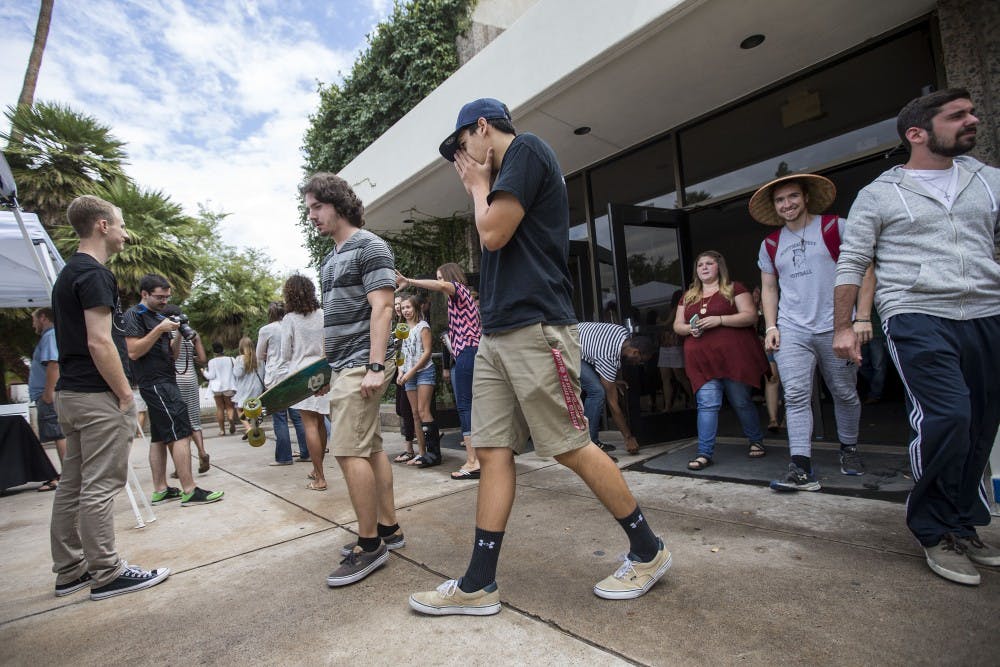Hope Church, the on-campus religious group which has been wrapped up in ASU investigations and public scrutiny for nearly a year, was removed from its status as an on-campus organization, according to multiple sources familiar with the situation.
The Council of Religious Advisors, or CORA — which is a governing group made up of roughly 30 ASU-related religious organizations — voted to remove Hope Church’s membership in the council.
Hope Church's spokesman Ricky Ruedaflores confirmed Hope was voted out of CORA and provided the following statement on the vote:
"This is a sad day for CORA and we are disappointed that the leadership of CORA held a vote on our membership over email without presenting any specific details to its members. Several members of CORA have reached out to express their support and to question CORA’s effectiveness going forward."
Without CORA membership, Hope will still be allowed to hold services on campus, but will be considered an “external entity” and will have to pay for all usage of University rooms and property, according to an ASU official who spoke on the condition of anonymity.
“We are a public university, so they know that if they want to use any of the University rooms, properties, they would have to use the same channels as any other external entity would when they want to rent a space here,” the official said. “... They have requested meetings with University leadership to get clarification on how they can move forward. Those conversations are just beginning.”
Tempe LDS Institute of Religion instructor E. Jay Richardson, who served as CORA president from 2015-17, said this is the first time that a member has been removed in at least six years.
“They’re not very common … I’ve been associated with (CORA) since 2011 and this is the first time that such a vote has come up,” Richardson said.
A member organization is eligible for dismissal if they fail to follow ABOR and ASU code of conduct policies, according to the CORA website.
“Failure to abide by these rules and regulations will be considered sufficient reason for dismissal from membership in the Council of Religious Advisors by a majority vote of the quorum,” according to the CORA constitution.
CORA President Tracy Rapp released a statement Friday on the vote.
"The Council of Religious Advisors at Arizona State University has voted to remove Hope Church from membership in the organization. This was a difficult process, but necessary given the findings of ASU’s investigation," the statement read. "CORA members look forward to continuing to support the religious and faith-based groups in the ASU community and to fostering a welcoming and enriching environment for students who seek religious opportunities while pursuing their education at ASU."
An ASU investigation found Hope Church to have violated three ABOR policies and three ASU-specific rules relating to its recruiting practices, according to a decision letter sent to the Church by the Office of Student Rights and Responsiblities in June.
As a result of that investigation, no one associated with Hope Church would be eligible for faculty associate status, a position that comes with benefits including an ASU ID, an ASU email, access to parking lots reserved for employees, and tuition benefits for the advisor and his or her family.
All CORA members are allowed three faculty associates, according to the ASU official. The sanctions say that all three Hope members will have that status revoked for at least four years. It is unclear which members of Hope leadership have faculty associate status.
Financial impact
Removal from CORA will also have significant financial impact on Hope if members continue to use Neeb Hall for their services.
Use of Neeb Hall will run an outside entity just over $3,500 per day, based on an $8-per-seat fee, according to the ASU Classroom Scheduling department.
Hope collected over $1,639,132 in total revenue — mostly through cash donations — in 2015, according to the Evangelical Council for Financial Accountability.
Its expenses totaled $1,609,902, leaving a $30,000 net profit, according to the ECFA website.
Read more: Investigating Hope Church
The ECFA provided a statement back in April but were not immediately available to comment on whether these decisions from ASU and CORA would affect Hope’s membership.
“ECFA exists to enhance trust in Christian churches and ministry organizations by providing accreditation to leading non-profit organizations that demonstrate compliance with the ECFA standards,” part of the statement read. “We welcome input from anyone concerned about our members’ compliance with these standards. Hope Christian Church has been a member of ECFA since March 2012.”
A parallel investigation
In April, The State Press reported that a parallel investigation into the use of six “front clubs” by the Church concluded with a four-year probation for five of the six clubs.
These clubs were reportedly used as a tool to recruit new members.
Stephen Wicker, a former member who was one of the first to bring his concerns to SRR, told The State Press in December that the church started an effort called “Operation 72” which was intended to introduce ASU freshmen to club leadership as a recruitment effort.
"They would like to meet as many freshman students as possible during their first 72 hours on campus because during this time, people are looking to get connected to something — make friends — so you want to get them early," Wicker told The State Press last year.
Editors Note: The State Press will update this page as more information becomes available.
Reach the reporter at reillykneedler@gmail.com or follow @reillykneedler on Twitter.
Like State Press on Facebook and follow @statepresss on Twitter.




